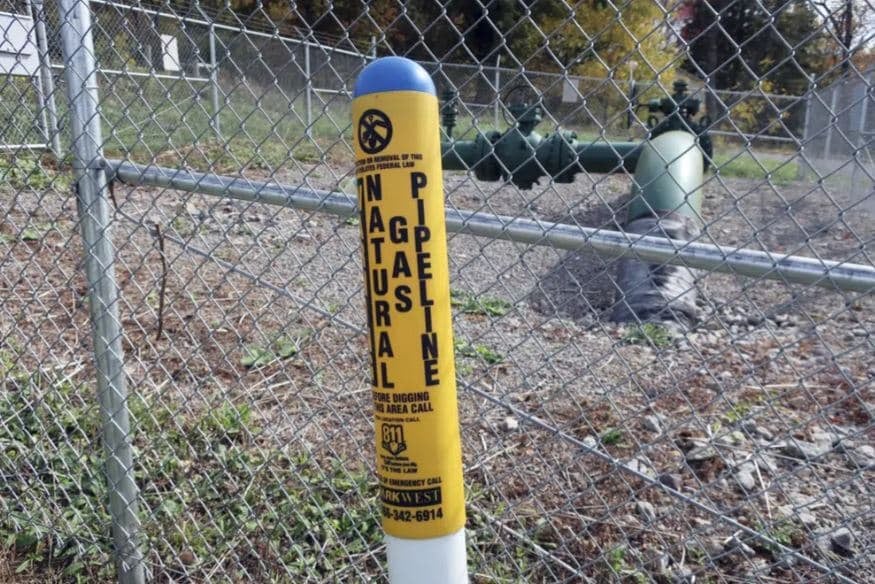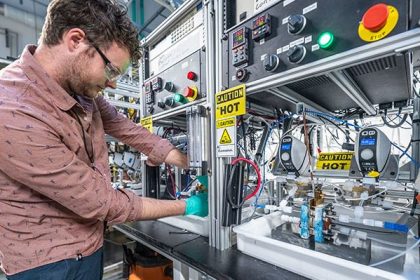Gas Pipeline Leak Detection, Repair Rule Proposed

WASHINGTON — Federal regulators have proposed a rule to improve the detection and repair of leaks in natural gas pipelines and storage facilities.
According to the Pipeline and Hazardous Materials Safety Administration the proposal, transmitted to the Federal Register on Friday, would dramatically reduce emissions of methane, boost efficiency and create an estimated $2.3 billion in annual benefits.
The rule would update decades-old federal leak detection and repair standards that rely solely on human senses in favor of new requirements that add an additional layer of safety by deploying commercially available, advanced technologies to find and fix leaks of methane and other flammable, toxic and corrosive gasses.
If implemented, the agency said, the proposal would enhance public safety and lower methane emissions and other air pollution from more than 2.7 million miles of gas transmission, distribution and gathering pipeline as well as; more than 400 underground natural gas storage facilities and 165 liquefied natural gas facilities.
The resulting improvements would advance environmental justice in communities where gas pipeline infrastructure is disproportionately sited, it said.
“Quick detection of methane leaks is an important way to keep communities safe and help curb climate change,” said Transportation Secretary Pete Buttigieg, whose department oversees PHMSA.
“We are proposing a long-overdue modernization of the way we identify and fix methane leaks, thereby reducing emissions and strengthening protections for the American people,” he said.
Fixing wasteful and dangerous pipeline leaks is a cornerstone of the Biden administration’s U.S. Methane Emissions Reduction Action Plan to cut energy waste and pollution, boost efficiency and create good-paying jobs.
In 2030 alone, this rule has the potential to eliminate up to 1 million metric tons of methane emissions — equivalent to 25 million metric tons of carbon dioxide, or the emissions from 5.6 million gas-powered cars, the agency said.
Overall, the rule would reduce emissions from covered pipelines by up to 55%. The proposal requires pipeline operators to establish advanced leak detection programs aimed at detecting and repairing all gas leaks by:
- Strengthening leakage survey and patrolling requirements by increasing the frequency of surveys and requiring the use of commercially available, advanced leak detection technology — such as aerial or vehicle surveys, handheld detection devices, and continuous monitoring systems—with flexibility for operators to use a range of approaches to meet a minimum performance standard.
- Reducing the volume of gas released due to unintentional emissions like leaks and equipment failures and revising the reporting minimum threshold to detect smaller leaks sooner.
- Minimizing intentional releases, such as those caused by equipment venting or blowdowns, associated with pipeline maintenance, repair, and construction and encouraging operators to consider cost-effective equipment that can capture the methane for later use.
- Establishing explicit criteria and timeframes for the timely repair of all leaks that pose a risk to public safety or the environment.
“On a bipartisan basis, Congress came to the commonsense conclusion that it is finally time to deploy modern technologies to find and repair pipeline leaks to prevent waste of valuable products and protect people and the environment,” PHMSA Deputy Administrator Tristan Brown said in a written statement.
“This rule will deploy pipeline workers across the country to find and repair leaks that will improve safety for the public — and will ensure America continues to be the global leader in methane mitigation, which is one of the most potent greenhouse gasses threatening the economy and our planet today,” he added.
Section 113 of the bipartisan PIPES Act of 2020 mandated the issuance of a rulemaking requiring the development of advanced leak detection programs capable of identifying, locating and categorizing natural gas leaks from pipeline infrastructure for timely repair.
In June of 2021, PHMSA issued guidance to gas and hazardous liquid pipeline operators that operators must update their operations and maintenance plans to minimize emissions, underscoring Congress’ new requirement in section 114 of the PIPES Act of 2020. In 2022, PHMSA fanned out across the country to inspect operations and maintenance plans to ensure compliance.
The proposed rule builds on these actions by indicating exactly what pipeline operators must do to comply once the rule is finalized.
Dan can be reached at [email protected] and at https://twitter.com/DanMcCue
Updated to remove errant quotation mark on section that was not a quote.

























